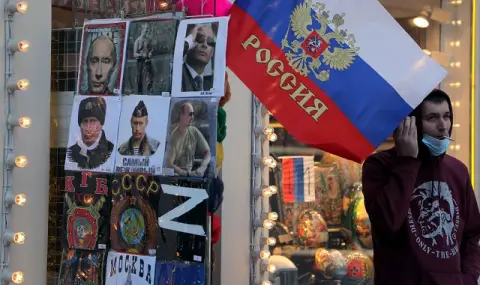Incomes in Russia are growing, but not everyone feels an improvement in their lives. What is the real economic situation of Russians?
During the three years of the war in Ukraine, official Russian economic statistics consistently painted a picture of general well-being. According to Prime Minister Mikhail Mishustin, in 2024, the population's incomes grew by 8.5 percent in real terms, i.e. taking into account inflation. And the growth over the three years reached 18 percent. The reason is known - the labor shortage caused by migration, mobilization and the voluntary departure of Russian men to war. Therefore, employers are forced to look for staff by offering higher salaries.
However, there is one important nuance: the high pace of income growth since the first years of the war only compensates for their decline from the previous decade, called by economists "lost". In 2020, real incomes were ten percent lower than in 2013 - before the crisis, which greatly damaged the Russian economy. In addition, it is possible that the competition in the wage sector will end in 2025.
Statistics do not provide data on how Russians themselves perceive their well-being, but an idea of this can be obtained from a large-scale survey of Russian households conducted by the National Research University "Higher School of Economics" and the company "Demoscope" with the participation of experts from the University of North Carolina and the Federal Research Center for Sociology at the Russian Academy of Sciences.
How the war affected perceptions of the standard of living
The data from the survey, which is representative, show that in 2023 the average Russian was more satisfied with his life in general, but also with his financial situation in particular, than before the war began. But this satisfaction is distributed quite unevenly across different social, age and territorial groups.
Older Russians, as well as residents of the Rostov region (the region closest to the front) say that their lives have worsened since the war began. But this is not strange - after all, not all incomes in Russia are growing. The real incomes of pensioners, for example, decreased by 0.8 percent in 2024, according to official statistics. At the same time, people with higher education, with the exception of residents of Moscow and St. Petersburg, are more likely to say that their well-being has worsened in recent years than people without higher education.
Residents of regions with a developed military industry feel the best, and this is not surprising. If in the economy as a whole wages have actually increased by 9.1 percent, in the defense industry the increase was 12.3 percent. It was also found that among representatives of all nationalities, ethnic Russians feel the most secure.
Russians are in no hurry to spend their money
Another curious observation is that despite the feeling of well-being, Russians have not started buying durable goods, i.e. clothes, appliances, cars, real estate, etc. - they strive to save more for a rainy day. In addition, the number of Russians who would survive for several months if they lost their income has increased.
What Russians definitely do not skimp on is entertainment. The explanation of Moscow State University professor Natalia Zubarevich is that "in times of anxiety, Russians like to eat and drink". She finds confirmation of this in the growth of demand for various services in regions close to the front.
The economy is slowing down. What will happen next?
However, in 2025, Russians' answers to these same questions may turn out to be completely different, believes Sinika Parviainen of the Bank of Finland. The latest statistics and most forecasts indicate that the Russian economy is slowing down. Most private companies can no longer raise wages at the same pace.
Finnish economists have made a forecast that in 2025 the Russian economy will grow by two percent, after which it will add only one percent per year, i.e. it will begin to stagnate. A possible end to the war could change the situation, but experts believe that this is unlikely. And a temporary truce would not change anything in principle.
If we imagine that Russia ended this war without starting to prepare for a new one, the economy would become more balanced. In addition, in this case, demobilized military personnel would also enter the labor market. However, the complex issue of reintegration would have to be resolved for them.
“These people will not receive as high salaries as at the front, but in an economic sense there is no problem in that - they will move around for a while and a year later they will agree to a lower salary”, Dmitry Nekrasov, director of the European Center for Analyses and Strategies CASE, told DW.
